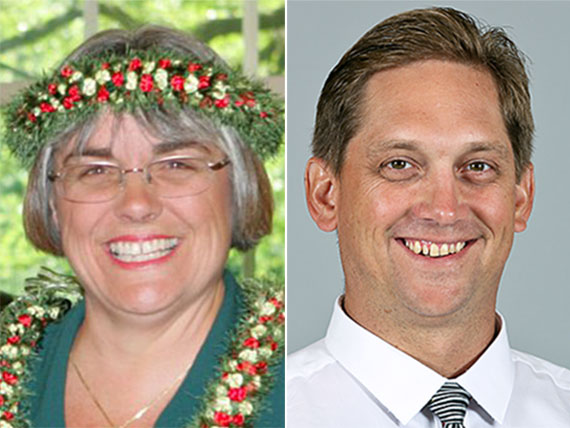
Two Hawai‘i State Department of Education science teachers have been named awardees of the prestigious Albert Einstein Distinguished Educator Fellowship Program, an honor that comes with a one-year federal research appointment in Washington, D.C.
Among the 14 educators nationwide who were granted fellowships for 2018-19 are:
- Hilo Intermediate science teacher Pascale Creek Pinner, who will serve at the U.S. Department of Energy’s Office of Science. The office is the lead federal agency supporting fundamental scientific research for energy and the nation’s largest supporter of basic research in the physical sciences.
- Kalani High science teacher Bryan Silver, who will serve at the National Science Foundation’s Directorate for Engineering. The branch is charged with supporting and investing in engineering research and education critical to the nation’s future.
“Pascale and Bryan are both highly motivated and innovative teachers, who will make excellent contributions to the federal agencies where they will be working,” said Lauren Kaupp, educational specialist for science in the state Office of Curriculum and Instructional Design. “Their achievements reflect positively on the community of science teachers in HIDOE and they will be excellent representatives of our Hawai‘i science ‘ohana.”
The Albert Einstein Distinguished Educator Fellowship Program provides a unique opportunity for accomplished K-12 educators in the fields of science, technology, engineering and mathematics (STEM) in public and private schools to serve in the national education arena. Fellows spend 11 months working in federal agencies, applying their extensive knowledge and classroom experiences to national education programs and education policy.
"At the end of the fellowship, educators are prepared to return home, equipped with access to a national network of education leaders and programs, a better understanding of the challenges and possibilities in STEM education, and a renewed passion for teaching, ready to make significant contributions to their schools and school districts," according to the program.
Contributions of past Einstein program fellows include:
- Designing new elements of national STEM education programs;
- Implementing major components of national STEM education programs;
- Drafting legislation and advising on policies that seek to improve K-12 education in the U.S.;
- Creating web-based science education tools; and
- Establishing and evaluating national and regional programs centered on school reform and teacher preparation in STEM.
Pinner, who has been a science teacher at Hilo Intermediate for the past 31 years, said she is honored and excited for the fellowship experience. She’s looking forward to having the opportunity to see the kinds of research happening at the 17 Department of Energy National Laboratories across the country.
“What I’m really hoping for is to work with the education directors at the National Labs to see if they would be willing to possibly provide internships for high school students,” said Pinner, who mentors intermediate and high school students competing in science fairs. “Finding pathways for our local kids is really important."
Both teachers previously were recognized as winners of the Presidential Awards for Excellence in Mathematics and Science Teaching (PAEMST), Pinner in 2003 and Silver in 2015.
The 2018-19 Albert Einstein Fellows were selected from a nationwide pool of applicants through a rigorous application and interview process and will begin their appointments Sept. 4, 2018.
